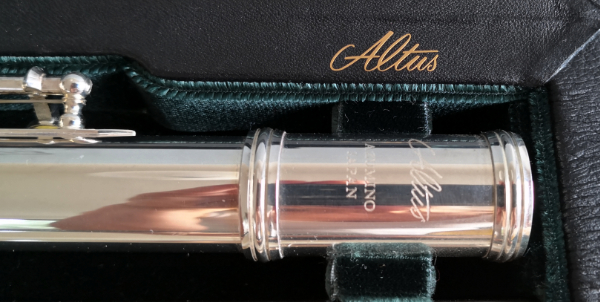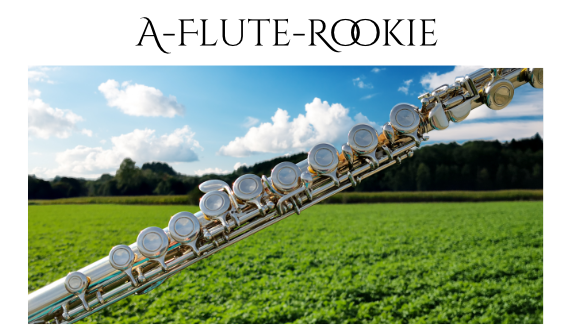September 2021
In the first lesson, the new flute is extensively tested by my teacher. She likes the warm sound (I could have bet on that) and is surprised by the smooth action. (How much more impressed she would have been with the Miyazawa, which played by itself almost by mind of power). The response is different on every flute, and she had to restart a few times. The flute makers at Altus and also Azumi, by the way, follow their own philosophy with the S-cut on the mouth hole.
In any case, we are starting the school term with the new flute, with confidence and about to finish my first school of notes by Wächter and Weinzierl. And with the great optimism that we won't have to endure another lockdown.
Over the holidays I practised the change to the upper octave often. It's a little easier to play a piece completely in the upper register. As an isolated exercise, it works quite well. It sounds clear by my standards. More or less. At least that's what a flute rookie thinks.
The impurity arises when changing from one register to the other. Single notes that I hit go a little better, but when I play them legato they vibrate and interfere with many other notes. Damn.
My teacher calmed me down a little. She says it's perfectly normal that there can be difficulties when you start to work more intensively on the next register. Many students experience this similarly to me and she is glad that I am no exception. It means that my concentration on the upper register is very active.
In my school of notes, I shimmy from one exercise to the next. First I play myself in with very long notes. Even in the two scales I know so far: G major and F major. Then I usually play through everything in the booklet, except for the really annoying or super boring pieces. At the end, I do the position change exercises. Always one after the other. If one works, then the next one the next time you practise. Until you get it right, and then the next one after that.
Why does this kind of practising never work in such a relaxed way, or in a similar way, when playing the piano? (Short inner moment of despair.)
I can't borrow any books on flutes, flute technique, flute history or flute sheet music at the moment. The Gasteig will be dismanteld and rebuilt in a few years. The Gasteig library is therefore moving and I'm not quite sure whether the music department will end up in the Motorama vis-a-vis or in HP8.
So there is no additional background knowledge for me at the moment. It has to be said, though, that the shelf with flute literature was noticeably smaller than the one with keyboard instruments or guitar.
 My new flute is so beautiful. I always have to look at it and admire it. Sometimes I even talk to her and wish her a good morning, for example. Hopefully these are not yet signs for I have gone a little crazy?
My new flute is so beautiful. I always have to look at it and admire it. Sometimes I even talk to her and wish her a good morning, for example. Hopefully these are not yet signs for I have gone a little crazy?
I like it when she sometimes shivers in that special way while playing. My daughter's Yamaha flute can't do that. It behaves more rigidly and inflexibly. The Altus develops this vibration when it is warm and well rehearsed. My hands like to feel this state.
I'm still leaving all five silicone plugs on the ringholes. I want to become more familiar with the flute and get used to the sound and behavior. I will know when the time has come to remove the first one. Of course, I've already taken all of them out and tried to play. Well. A few holes are easier to cover with my fingertips than the others. You can hear that clearly. But I'd rather stay defensive for now. Don't want to overwhelm my beautiful, slim, silver friend with me.
A little anecdote at the end:
The shepherd god Pan fell in love with a beautiful tree nymph named Syrinx. But she eluded him and ran away from him to the banks of the river Ladon. There, with the help of Atremis, she transformed herself into a reed. Pan made his way through the reeds but could not find her. He cut off the reeds, knotted them with wax and made a flute out of them to lament his sorrow on.
In this way he invented the sweet-sounding pan flute and gave it the name Syrinx.


